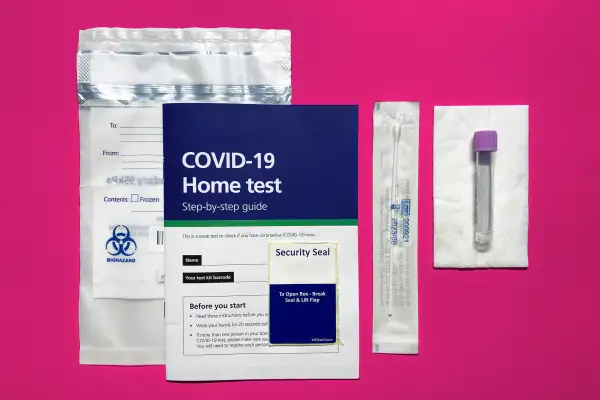PSA: You Can Use Your FSA Money to Buy At-Home Coronavirus Tests

For many Americans, December is a mad shopping rush — not only to buy gifts for the holidays, but also to spend all the money in their Flexible Spending Accounts before it expires. This year is no exception, but it has a pandemic twist: People are using their FSA dollars to buy at-home coronavirus tests.
Rida Wong, president of Health-E Commerce, tells Money that home collection COVID-19 tests have been a top-selling item since they launched on FSAstore.com in October. They're even advertised on the homepage.
Legally, coronavirus testing is free for everyone in the U.S., even if you don't have insurance. But getting to a testing site and waiting for results can be inconvenient from a planning perspective. To that end, the Food and Drug Administration has issued emergency authorizations for roughly 300 tests and sample collection devices, some of which can be used at home.
The products are legitimate, but they're not cheap. And that may make them an attractive option for people trying to spend the pre-tax dollars earmarked for out-of-pocket medical and dental expenses in their FSA.
FSAstore.com sells a polymerase chain reaction (PCR) test from MyLabBox for $199.99. Customers buy the kit, collect their own saliva sample and mail it in to be analyzed. They get results back in as little as 24 hours after the sample is received by the lab, and if they're positive, they can consult with a physician.
Similarly, Everlywell specifically says on its website that its $109 home coronavirus test, a nasal swab kit, "is covered by participating FSA and [Health Savings Accounts] plans." Costco's site notes that its $129.99 and $139.99 tests through Azova are FSA eligible, too.
Generally, FSA plans reimburse people for expenses not covered by insurance. You may have to submit a claim, provide receipts or use a special debit card, so investigate before you splurge.
Due to the use-it-or-lose-it nature of FSAs, Wong estimates more than $400 million in FSA funds go unspent every year. She says people may have more money to use this year than normal because the pandemic led them to postpone doctor's appointments and procedures. Thanks to the CARES Act, over-the-counter medications and feminine care products like tampons, pads and menstrual cups are now eligible for FSA reimbursement. This year has also seen thermometers, nasal irrigation kits and products to help minimize maskne spike in popularity.
"Overall, I think there's just been a lot more increase in awareness about health as a result of COVID-19," Wong says.
However, should you choose to buy and take an at-home coronavirus test, remember that a negative result doesn't give you automatic permission to frolic mask-less through large crowds. In addition to the risk of false negatives, experts say COVID-19 tests only provide a snapshot of a moment in time.
Even the FDA admits "no test is 100% accurate," so proceed with caution.
More from Money:
Here's Your End-of-Year Financial To-Do List
Make These 6 Money Moves in December to Maximize Your 2020 Tax Benefits
